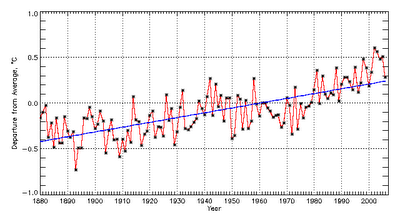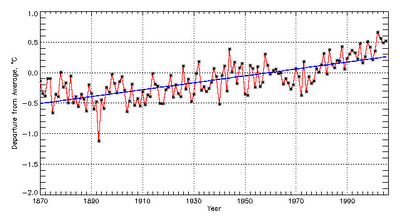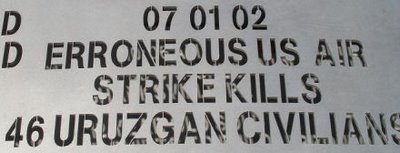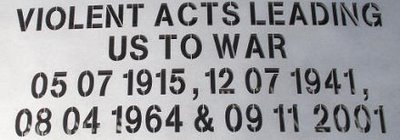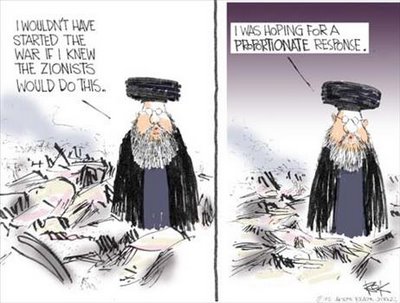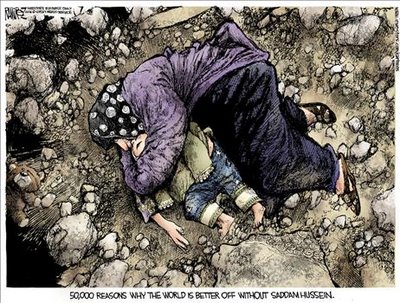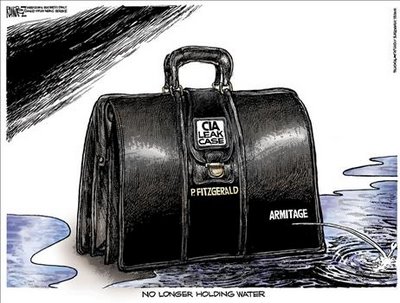The Euston Manifesto refers to a coming together of a group of British liberals who have come to understand the extent of the threat to civilized values represented by the Islamic fundamentalists. They proclaimed their public recognition of this threat and, while not all of them support the war in Iraq, they proclaim their support of the British government's anti-terrorism programs. A group of American liberals, seeing the Euston Manifesto, and coming to similar conclusions, have decided to issue an American version of the Euston Manifesto, and have created a website where American liberals can add their voices and their signatures. There are already more than 2500 signatures collected, and you can add yours by going here. This is such a hopeful sign of possible future unity on the most serious threat facing the western world, that I thought it important to bring it to you.
American Liberalism and the Euston Manifesto
Written by Jeffrey Herf et al.
Tuesday, 12 September 2006
We are signers or supporters in the United States of the Euston Manifesto and its reassertion of liberal values. Our views range from those of centrists and independents to liberals of varying hues on to the democratic left. We include supporters of the decision to go to war in Iraq in 2003 as well as people who opposed this war from the beginning. However, we all welcome and are heartened by the decision of the writers of the Euston Manifesto in Britain to reassert and reinvigorate liberal values in the present context. Now we confront the issue of how to respond to radical Islamism. Some of us view this ideology and its political results as the third major form of totalitarian ideology of the last century, after fascism and Nazism, on the one hand, and Communism, on the other. Others regard it as having a history in the Arab and Islamic world that eludes the label of totalitarianism. We all agree however that it fosters dictatorship, terror, anti-Semitism and sexism of a most retrograde kind. We reject its subordination of politics to the dictates of religious fundamentalists as well as its contempt for the role of individual autonomy and rationality in politics, a rejection not seen on this scale in world politics since the 1940s. We understand that the United States must continue to take the lead with our allies in confronting this danger.
Our views in foreign policy are rooted in the traditions of Franklin Roosevelt as well as Harry Truman, who battled dictatorships of the right as well as the left respectively. For their generation, the key questions of international politics concerned totalitarianism in Europe and Asia. They led the country in war to defeat fascism, Nazism, and Imperial Japan and then founded the institutions that led to the peaceful victory in the Cold War over Communism. The key moral and political challenge in foreign affairs in our time stems from radical Islamism and the jihadist terrorism it has unleashed. We favor a liberalism that is as passionate about the struggle against Islamic extremism as it has been about its political, social, economic and cultural agenda at home. We reject the now ossified and unproductive political polarization of American politics rooted as it is in the conflicts of the 1960s, not the first decade of this century. We are frustrated in the choice between conservative governance that thwarts much needed reforms at home, on the one hand, and a liberalism which has great difficulty accepting the projection of American power abroad, on the other. The long era of Republican ascendancy may very well be coming to an end. If and when it does, we seek a renewed and reinvigorated American liberalism, one that is up to the task of fighting and winning the struggle of free and democratic societies against Islamic extremism and the terror it produces.
We regard anti-Americanism as a low and debased prejudice, not the mark of political sophistication or wisdom. We reject all forms of racism, including antisemitism, and also invoke the leaders of the American civil rights movement who won great political victories because they understood that hatred and terror would produce only more of the same. In the face of the retrograde attitudes about women and homosexuals emerging from the Islamic fundamentalists, and as advocates of the universality of human rights, we support equality for women and gays. Though most of us oppose much of the Bush administration's domestic policies and have many criticisms of how it has conducted its foreign policy, we believe that some facts about international politics are not a matter of left and right. It is true that the knowledge about how to develop and deploy chemical, biological and most importantly nuclear weapons has [been], is and will be spreading around the globe and thus potentially into the hands of rogue states and terrorists deeply hostile to liberal democracy and respect for human rights. Indeed, the experience of fascism and Nazism showed us that it was possible for Germany, Italy and Japan to embrace modern technology yet at the same time reject liberal democracy and embrace policies of racism, chauvinism, aggression and mass murder. In our time, this paradoxical embrace of technological and scientific modernity that goes hand in hand with rejection of liberal democracy and human rights is taking place among radical Islamists, including those in the government of Iran, supported as well by non-Islamic states such as North Korea.
Even though we may differ on the proper response, we view the prospect of a nuclear armed Iran with alarm. Such a state with these weapons would be a grave danger for the Middle East, Europe and the United States. It would increase the danger that such weapons might wind up in the hands of radical Islamist terrorist groups immune to the calculations of nuclear deterrence. In contrast to the Communists during the Cold War, who wanted to change, not depart from this world, the cult of death and martyrdom of the terrorists inspired by Islamic fundamentalism raises deeply troubling questions about the prospects for peace and security in the future. We take very seriously and find utterly repugnant the threats of Iran's political leaders to "wipe out" the state of Israel. We will not remain silent in the face of these genocidal threats to implement what would amount to a second Holocaust. We note as well that the vast majority of victims of the jihadist fanaticism have been other Muslims. Yet the passions of too many liberals here and abroad, even in the aftermath of terrorist attacks all over the world, remain more focused on the misdeeds and errors of our own government in Iraq than on the terrorist outrages by Islamic extremists. Anger at the Bush administration, however justified, should not trump opposition to all aspects of jihadism.
We stress that the efforts of liberal and free societies to defeat the radical Islamists is not a clash of civilizations, just as the war against Nazism, Italian Fascism and Imperial Japan was not a war against the totality of the cultures and history of Germany, Italy and Japan. Each of these societies had multiple traditions other than those of dictatorship and aggression. Fundamentalist Islamists do not speak for Muslims as a whole. Yet we soberly observe that, as Arab liberals and Muslim moderates have pointed out, democratic values and critical reflection on religious belief that have long been part of Western modernity remain comparatively weak in the Arab and Muslim world. Moreover, some Arab states have used wealth from petrodollars to finance religious fundamentalism, rather than to fully enter into the modern world. We agree with and lend our support to those Arab and Muslim liberals and modernists who argue that the internal modernization and liberalization of the Arab and Islamic societies are essential. But we do them no favor by moderating our criticism of the extremists in their midst who threaten and attack them.
In both World War II and the Cold War, liberals, centrists and conservatives found moments of commonality. Indeed, if those efforts had been borne exclusively by the left or the right they very well might have failed. For us, part of the Euston Manifesto's importance lies precisely in bringing this insight to bear on our current dilemma and in recalling the traditions of American liberal anti-fascism and anti-totalitarianism that remain important today. In the United States, the struggle against Islamic extremists should not be the preoccupation for conservatives alone nor can it be waged successfully by liberals alone. The challenge we face from Islamic extremism is one to values and institutions that Americans across a broad political spectrum hold dear. Unfortunately, President Bush did not seize the moment after 9/11 to bridge the political divide. Rather than govern from the center, he has governed from the right in the realms of taxation, energy policy, global warming, social security, the role of religion and culture war issues.
In light of the tragedies of the war in Iraq and the ineptitude in the Bush administration that helped to produce them, the partisan divide has deepened even more. We know that in the preparation for the war in Iraq the Administration did not listen to many of its own diplomats and military officers who called for a larger invasion force and anticipated the problems and disasters that have enveloped Iraq after the initial phases of the war in 2003. We recognize that in the management of the war, the Bush administration has erred egregiously in ways---at Abu Ghraib, Guantanamo and elsewhere---that undermine the very values for which this war must be fought and won. Tolerance for torture or ambiguity about the application of the Geneva conventions is both wrong and self-defeating. We agree with the implications of decisions by the United States Supreme Court, former high ranking military officials and many members of Congress that the Geneva conventions concerning treatment of prisoners of war should apply wherever the United States is holding prisoners captured in the effort to contain, thwart and defeat the terrorism inspired by Islamic extremism. We support higher mileage per gallon requirements for cars and a national gasoline tax (with relief for low income drivers) to reduce greenhouse gas emissions and the amount of petrodollars now fueling Islamist radicalism and to contribute to slowing and reversing global warming.
The signers of this statement include supporters of the decision to go to war in Iraq and others who opposed this decision from the beginning. Despite our agreement about many things in this manifesto, our differences on this issue remain. Our group includes signatories who view the war as a failure and a diversion from the struggle against radical Islamists. They therefore advocate an American withdrawal at the earliest possible time, especially in light of Sunni-Shia sectarian violence enveloping that country. However others amongst us point to the fragile beginnings of democracy after dictatorship and think success there is still possible and essential. In their view an American exit before stability and security are established would be a disaster for international and national security and would be seen in many parts of the world as a victory for radical islamists and unreconstructed Baathists.
We realize that the path to a new and reinvigorated liberalism in foreign policy will be difficult. The political habits of the post-Vietnam era are hard to break. Yet we think that the terror unleashed by the radical Islamists has begun to refocus some liberal minds. We have authored this statement and urge other like-minded citizens to join us in the hopes that this rethinking will become clearer and more vigorous as a result of debate and discussion we hope to stimulate. We believe liberals have important contributions to make in the struggle against the Islamic extremists. Indeed, we believe that this struggle's successful outcome depends in part on our engagement on the basis of deeply held values and traditions.
Authors
Jeffrey Herf, History, University of Maryland, College Park
Russell Berman, Stanford University, Editor, Telos
Thomas Cushman, Wellesley College, Editor, Journal of Human Rights
Richard Just, Deputy Editor, The New Republic
Robert Lieber, Georgetown University
Andrei Markovits, Political Science and German Studies, University of Michigan, Ann Arbor
Fred Siegel, Cooper Union College


